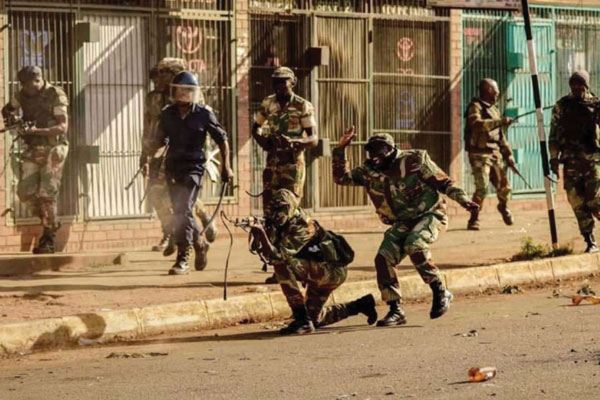
I HAD never seen a real life battlefield situation in my life, but when I saw the soldier kneel down on the debris-filled tarmac and start firing repeatedly, I knew this was a real shootout.
BY TAPIWA ZIVIRA

With his hands firmly gripped on the trigger, the soldier sprayed bullets all over, his face twisted as if he was in some kind of a trance.
As he continued firing, with the gun jerking up and down and releasing some whitish smoke as each bullet shot out, it was clear his gun was not pointed into the air, but towards the hundreds of unarmed civilians who were fleeing down Jason Moyo Avenue in Harare city centre.
I just stood there frozen.
Earlier, thousands of mostly young men and women were congregated along Jason Moyo, between the intersection with Kaguvi and Rotten Row streets, singing and chanting slogans denouncing what they called an attempt by the Zimbabwe Electoral Commission (Zec) to “steal victory from the MDC Alliance”.
The targets for the youths were the Zec offices along Jason Moyo Avenue, the commission’s national command centre situated some metres away at the Rainbow Towers Hotel.
Their initial attempt to enter the Rainbow Towers was blocked by police who started firing teargas and spraying water.
- Chamisa under fire over US$120K donation
- Mavhunga puts DeMbare into Chibuku quarterfinals
- Pension funds bet on Cabora Bassa oilfields
- Councils defy govt fire tender directive
Keep Reading
Eventually, the youths were relegated to singing in the streets, barricading most of the major roads leading into the city centre.
The singing continued, and it was about to get to a point when the momentum was about to die down that an alarm was raised that soldiers were getting into the streets.
People started fleeing in all directions and there I was, standing at the corner of Harare Street and Jason Moyo Avenue, not knowing what to do.
The singing died down and for a moment, there was some silence, and I could hear my breath and heartbeat.
That is when an army truck full of soldiers emerged at the intersection of Jason Moyo Avenue with Rotten Row Streets.
I watched, dumbfounded and not even sure what was about to happen, as soldiers quickly disembarked from the truck and started running towards the crowds, who by now were scattered all over the streets, fleeing in all directions.
The momentary silence was broken when that soldier cocked his gun and started firing.
I always believed that proper war discipline mandated soldiers not to open fire using live bullets on fleeing, unarmed civilians, especially in a metropolitan environment, and if they had to and had a target to be shot, there was supposed to be warning shots.
I was proved wrong in all that.
I witnessed, in disbelief and fear, while standing cold and stiff at a pavement on the intersection of Jason Moyo Avenue and Harare Street, as one of the soldiers continued to spray bullets at fleeing people.
Almost at the same time, the whole city was filled with the gunfire.
It was clear the army had been deployed, not just, close to where I was standing, but in all parts of the city.
People were running in all directions, confused and unaware of what was happening. All they heard were gunshots and all they saw were soldiers advancing towards them and commandeering them to move out of town.
Since we were carrying tags clearly marked Local Press, the army ignored us and continued on their assault on the people, in some cases using guns or whips as they drove people in all directions.
We watched and recorded it as it happened, all the while wondering why this was happening just two days after Zimbabwe held elections in a generally peaceful environment.
In the melee, I witnessed a security guard being beaten up, and was left lying in tears, his leg broken.
As we tried to help, another wave of soldiers came from one side and everyone who was trying to help the man had to flee.
Eventually, during a brief absence of the soldiers, a well-wisher carried him to hospital in his car.
At one corner of the streets, I met a young woman who was panting as she ran away, her legs dripping with blood.
I managed to ask her what had happened and all she could do, in between short breaths was, “masoja!” while pointing at three armed soldiers who were advancing from one end of the street.
As she continued to run, I followed her and she told me that she had gone to submit her curriculum vitae for employment.
She is one of the many unemployed young people in Zimbabwe.
For those that were far from this sad situation, no word can explain the grief I experienced while watching a young man breathe his last near the Rezende bus rank, and tears swelled in my eyes when I assisted one woman to carry her bags and little daughter as soldiers ordered her to run for dear life.
As the sun set on Harare and soldiers continued their assault on citizens, it appeared all the peace and calm that the country had purportedly enjoyed during the past eight months was gone.
The days of armybae (sic) were gone, and it was back to the old Zimbabwe, where any protest would be met with the utmost State sanctioned brutality.











